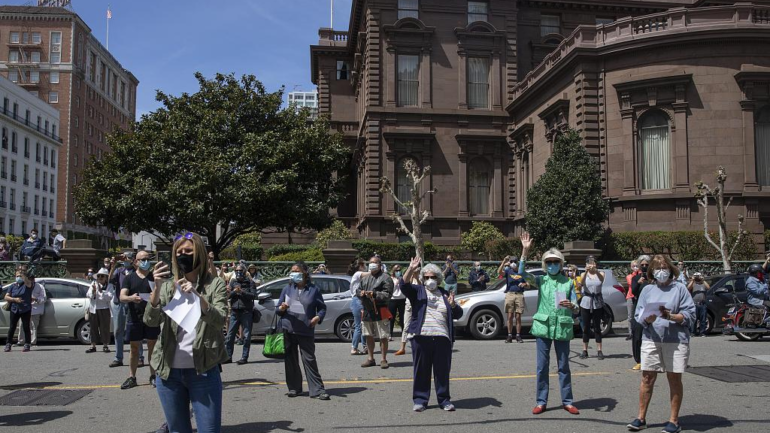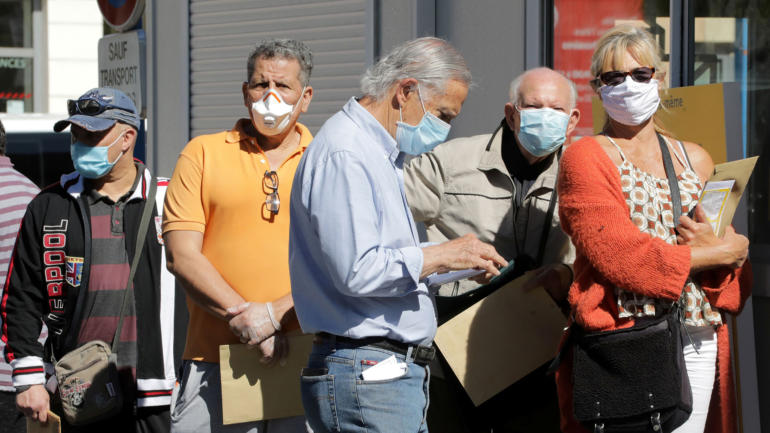The so-called “Five Eyes” intelligence-sharing alliance between Australia, Canada, New Zealand, the UK and the U.S. is divided over the origin of COVID-19. The U.S. alleges that China covered up the outbreak which U.S. Secretary of State Mike Pompeo claimed began in the Wuhan Institute of Virology’s P4 laboratory, while the other four countries are much more cautious in their assessments and haven’t yet jumped to such a provocative conclusion despite a lot of pressure upon them to do so.
Editor’s note: Andrew Korybko is a Moscow-based American political analyst. The article reflects the author’s opinion, and not necessarily the views of CGTN.
Both CNN and The Guardian published pieces at the beginning of the week citing unnamed intelligence sources from the four non-U.S. members of the alliance contradicting America’s reports of the Chinese government’s complicity in this pandemic. The former’s article is titled “Intel shared among U.S. allies indicates virus outbreak more likely came from market, not a Chinese lab,” while the latter’s is headlined “Five Eyes network contradicts theory Covid-19 leaked from lab.”
These reports raise uncomfortable questions about the secretary of state’s contentious accusation over the weekend that his country is supposedly in possession of “enormous evidence… that [COVID-19] came from that laboratory in Wuhan.” It also throws into doubt a report published around the same time by the Australian Daily Telegraph alleging that a secret 15-page document was prepared by “concerned Western governments” (a likely euphemism to the “Five Eyes”) blaming the Chinese government for the outbreak.
The “Five Eyes” evidently don’t see eye-to-eye on this issue, nor for that matter does America’s own intelligence community after the Office of the Director of National Intelligence released a statement last week about how it “concurs with the wide scientific consensus that the COVID-19 virus was not man-made or genetically modified.” It therefore seems to be the case that the U.S. President Donald Trump’s administration is following in the footsteps of Bush Jr. by attempting to manipulate the country’s intelligence community in order to mislead the rest of the world.

More than 100 people gather to pray for the frontline health workers in San Francisco, April 25, 2020 /CFP
The New York Times reported last week that “Trump Officials Are Said to Press Spies to Link Virus and Wuhan Labs,” which can’t help but remind any objective observer of the “Weapons of Mass Destruction” lies in the lead-up to the U.S. invasion of Iraq in 2003. It later turned out that the Bush Jr. administration’s claims were entirely false and the result of its hyper-politicization of the intelligence community, the same as it seems is presently happening in the Trump one when it comes to its claims about COVID-19’s origin.
The U.S. is the de-facto leader of the “Five Eyes” and therefore has an interest in pressuring its allies to publicly agree with its politicized assessment in order to present the image of a so-called “united front” against China, just as it earlier sought to do against Iraq for different ends. Unlike back then with Iraq, there’s no possibility of the U.S. invading China, but the reason why it wants to manufacture the illusion of international consensus against it (or at least assemble another “Coalition of the Willing”) is to put additional pressure on the country.
The U.S. can’t do it alone in this respect since it doesn’t have the leverage necessary to do so. As a case in point, Trump had previously threatened to “decouple” the U.S. and China during the height of the trade war that he launched against his country’s largest trade partner. Despite that, however, the effects were manageable for the Chinese side even in the event that they never agreed to last year’s deal. This goes to show that the U.S. needs other countries such as those from the “Five Eyes” alliance to follow its lead if it wants any chance to succeed.
Those countries, however, are already pushing back a bit since the responsible members of their governments (especially those in the intelligence community) realize that they’re being led down the same path as they were during Bush Jr.’s run-up to the Iraq War. This somewhat unexpected development poses a serious challenge to the U.S. plans, which is why the Trump administration might soon intensify its campaign of pressure upon them in the coming future, though that could easily backfire if it goes too far.
 CGTN America
CGTN America
